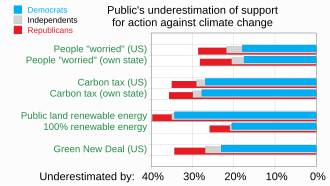
Back تجاهل الأغلبية Arabic Pluralitní ignorance Czech Pluralistisk ignorance Danish Pluralistische Ignoranz German Ignorance pluraliste French בורות פלורליסטית HE Ignoranza pluralistica Italian 多元的無知 Japanese 다원적 무지 Korean Pluralistyczna ignorancja Polish
This article may require copy editing for grammar, style, cohesion, tone, or spelling. (February 2024) |

In social psychology, pluralistic ignorance (also known as a collective illusion)[3] is a phenomenon in which people mistakenly believe that others predominantly hold an opinion different from their own.[4] In this phenomenon, most people in a group may go along with a view they do not hold because they think, incorrectly, that most other people in the group hold it. Pluralistic ignorance encompasses situations in which a minority position on a given topic is wrongly perceived to be the majority position, or the majority position is wrongly perceived to be a minority position.[5][6]
Pluralistic ignorance can arise in different ways. An individual may misjudge overall perceptions of a topic due to fear, embarrassment, social desirability, or social inhibition. Individuals may develop collective illusions when they feel they will receive backlash when they think their belief differs from society's belief.[7] From a group-level perspective, and arguably the most accurate way of analyzing pluralistic ignorance, causes of divergence between public behaviors and private opinions are caused by conservative lags (change in attitude without a change in behavior), liberal leaps (change in behavior without a change in attitude), and social identities (conforming to societal expectations of how one should behave based on the traditional ideals of the group).[8][9]
However, pluralistic ignorance describes the coincidence of a belief with inaccurate perceptions, but not the process by which those inaccurate perceptions are arrived at. Related phenomena, such as the spiral of silence and false consensus effect, demonstrate that pluralistic ignorance is not unique in its inaccurate assumption of others' opinions and these misconceptions can lead to negative consequences like groupthink and the bystander effect.[10][11]
- ^ Sparkman, Gregg; Geiger, Nathan; Weber, Elke U. (23 August 2022). "Americans experience a false social reality by underestimating popular climate policy support by nearly half". Nature Communications. 13 (1): 4779. Bibcode:2022NatCo..13.4779S. doi:10.1038/s41467-022-32412-y. PMC 9399177. PMID 35999211.
- ^ Yoder, Kate (29 August 2022). "Americans are convinced climate action is unpopular. They're very, very wrong. / Support for climate policies is double what most people think, a new study found". Grist. Archived from the original on 29 August 2022.
- ^ Bicchieri, Cristina; Fukui, Yoshitaka (1999). "The Great Illusion: Ignorance, Informational Cascades, and the Persistence of Unpopular Norms". Business Ethics Quarterly. 9 (1): 127–155. doi:10.2307/3857639. JSTOR 3857639.
- ^ Nickerson, Charlotte (May 11, 2022). "Pluralistic Ignorance: Definition & Examples". www.simplypsychology.org.
- ^ Miller, Dale T.; McFarland, Cathy (1987). "Pluralistic ignorance: When similarity is interpreted as dissimilarity". Journal of Personality and Social Psychology. 53 (2): 298–305. doi:10.1037/0022-3514.53.2.298. ISSN 0022-3514.
- ^ Katz, Daniel; Allport, Floyd Henry; Jenness, Margaret Babcock (1931). Students' attitudes; a report of the Syracuse University reaction study. Syracuse, N.Y.: Craftsman Press.
- ^ Schwenkenbecher, Anne (16 February 2021). "How We Fail to Know: Group-Based Ignorance and Collective Epistemic Obligations" (PDF).
- ^ Sargent, Rikki H.; Newman, Leonard S. (June 2021). "Pluralistic Ignorance Research in Psychology: A Scoping Review of Topic and Method Variation and Directions for Future Research". Review of General Psychology. 25 (2): 163–184. doi:10.1177/1089268021995168. ISSN 1089-2680. S2CID 233661750.
- ^ Terry, Deborah J.; Hogg, Michael A., eds. (1999-11-01). Attitudes, Behavior, and Social Context: The Role of Norms and Group Membership (0 ed.). Psychology Press. doi:10.4324/9781410603210. ISBN 978-1-4106-0321-0.
- ^ Miller, Dale T. (2023). "A century of pluralistic ignorance: what we have learned about its origins, forms, and consequences". Frontiers in Social Psychology. 1. doi:10.3389/frsps.2023.1260896. ISSN 2813-7876.
- ^ Donsbach, Wolfgang; Salmon, Charles T.; Tsfati, Yariv (2014-01-03). The Spiral of Silence: New Perspectives on Communication and Public Opinion (1 ed.). New York: Routledge. doi:10.4324/9780203125007. ISBN 978-0-203-12500-7.
© MMXXIII Rich X Search. We shall prevail. All rights reserved. Rich X Search